If you have seen ‘Okja’, which I am assuming you have since you are here, you will agree when I say that it isn’t simply tough putting ‘Okja’ under a single genre or even a dual genre, it’s much more of an impossible task, although one that we’d happily undertake and be defeated by its impossibility. The same can also be said for director Joon-ho Bong’s entire filmography, nearly. Even the thrillers that he has made, some excellent ones including ‘Snowpiercer’, ‘Mother’ and ‘Memories of Murder’ are standouts not simply because they are well made, but because they had so much more to say in what the eccentric director terms a universal language. Come to think of it, when he says “universal language”, his deliberate intermixing of genres is quite understandable. Even in the absurdity of it, you can find it to be a bit more relatable than say an out and out mystery film or an all-out drama film. Such is the whimsy of human happenings, they are never unilateral or genre abiding, so to say, and Joon-ho Bong knows that and quite ably reflects that in his films. That is why most of his films worked, that is why ‘Okja’ works. SPOILER AHEAD. If you haven’t seen the film yet, head over to Netflix.
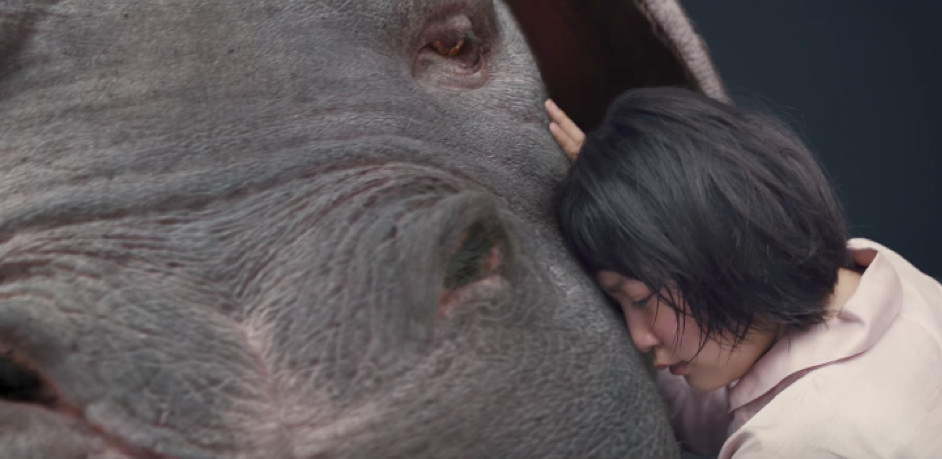
‘Okja’ creates a world nothing too different from our current one, but it is imbued with such manic energy and zany characters, ones that you take to hate for all the right reasons and some that you unfailingly love, that you are happily taken along for a ride. Everything isn’t sweet as roses though, since by the end of the film, you’d realise that the film took you on that emotional rollercoaster of a ride only to violently throw you off without any warning: perhaps that’s the best way a twist is delivered, especially when it’s a true one and the message needs to be driven home, one way or another. ‘Okja’ is a well-made film that chooses to address a lot of things at once, primary among them being humans and their tendency to simply exploit everything they can get their hands on in abundance. We will discuss more on what themes ‘Okja’ addresses later, but for now, let’s delve deeper into the narrative and style of the film. Read on.
Summary of the Plot: The Premise

The film begins in 2007 in New York, when Lucy Mirando, an industrialist masquerading as an environmentalist takes over her duties as CEO for Mirando Corporation succeeding her eventhemore twin evil sister, Nancy, and as part of the continued PR exercise, announces to the media that the company under her leadership would move away from the tyrannous ways of the erstwhile CEOs and look to newer core values of humanity and environmental consciousness. She then announces that as part of the company’s initiative to eliminate hunger in the US, they would be working on a “super pig” program, as part of which, the sixteen super pigs they had bred at their labs (through natural mating she tells the press) from a super piglet “miraculously” discovered at a Chilean farm, would be sent to sixteen farmers across the world where the Mirando offices were, who would then raise those pigs from indigenous methods, and at maturity, would be shipped back to New York where one pig, the biggest and most beautiful of them all would be crowned the best super pig.
Mija
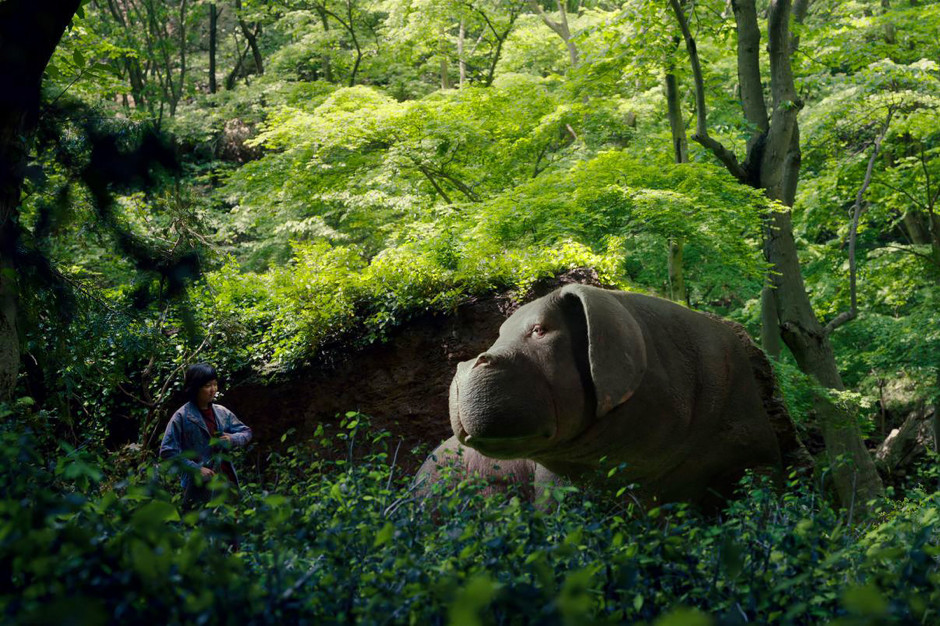
A jump to ten years later, and we see one of the super pigs, Okja, being raised in the hills of South Korea by a young girl named Mija and her farmer grandfather. Mija and Okja spend most of the day living a laid back life roaming the forests and just enjoying their quaint existence in the hills. Okja is seemingly an intelligent creature with enhanced empathy and emotional connect, as we see them not only live together, but connect together too. On one instance, Okja endangers his own life to save Mija’s too. You instantly give in to the cutesy bond between the two, and grow empathetic towards them even though nothing to incite that empathy has happened in the opposite direction. It’s just, plainly said, engaging. Maybe it is Okja’s CGI design, or Ahn Seo-hyun’s wondrous eyes, or the beautiful hills and forests of Korea, but it’s all very alluring, and you instantly know that even though all seems well now, there are going to be moments when your engagement with the central characters is going to be put to the test.
Dr. Johnny Wilcox
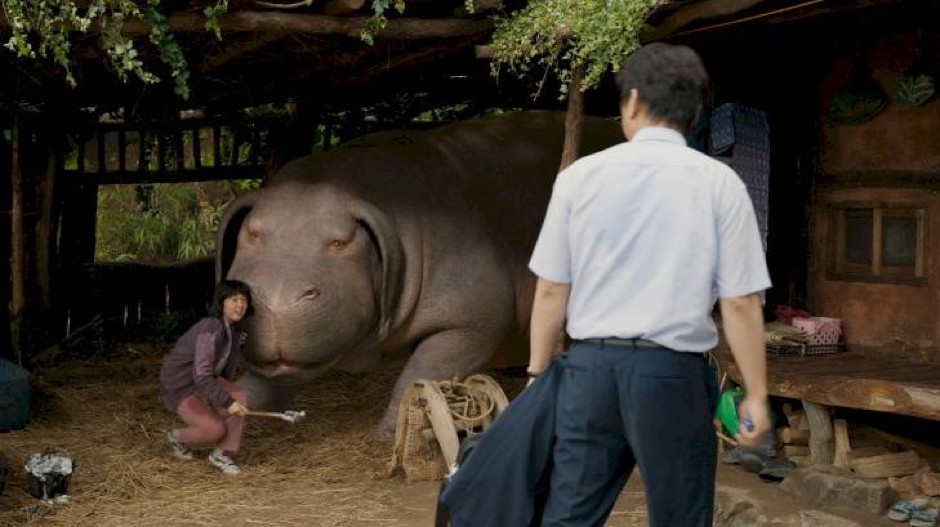
As happens, one day, the Mirando representatives turn up at their doorstep, accompanied by Dr. Johnny Wilcox (a zanier than usual Jake Gyllenhaal), a zoologist and TV presenter, who as part of the company’s renewed PR attempts is the face of the super pig program. He crowns Okja the best super pig and reveals that they will take Okja to New York the same day. Mija, who is unaware of the English language, is lured away by her grandfather when they are taking Okja away, and presents her with a pig figure made of solid gold, while revealing the truth to her softly by himself.
A visibly disturbed Mija decides to go to Seoul where Okja is currently, to soon fly to New York. She reaches Mirando’s head office in Seoul all by herself where she sees Okja being loaded onto a truck. While she chases the truck on foot and catches on, the truck is intercepted by the Animal Liberation Front (ALF) who save both of them from Mirando’s captors. Their leader, Jay (an amazing Paul Dano) talks to Mija using K (who is Korean) as translator and tells her that they plan to expose Mirando’s brutality and mistreatment of its animals by installing a recording device under Okja’s ear that will give them video proof of their foul ways. He also reveals that the farmers and the super pig program were just a farce and being used as mere promotional devices to hide the fact that the super pigs were infact genetically mutated pigs produced in millions by the Mirando Corporation. He further says that they will go ahead with the plan only if they have Mija’s approval, who instantly refuses, but K deliberately mistranslates and she unwittingly becomes a part of the plan. While all of the ALF members jump off into the river and escape, Okja is recaptured as Mija helplessly watches on.
Reunion of Mija and Okja
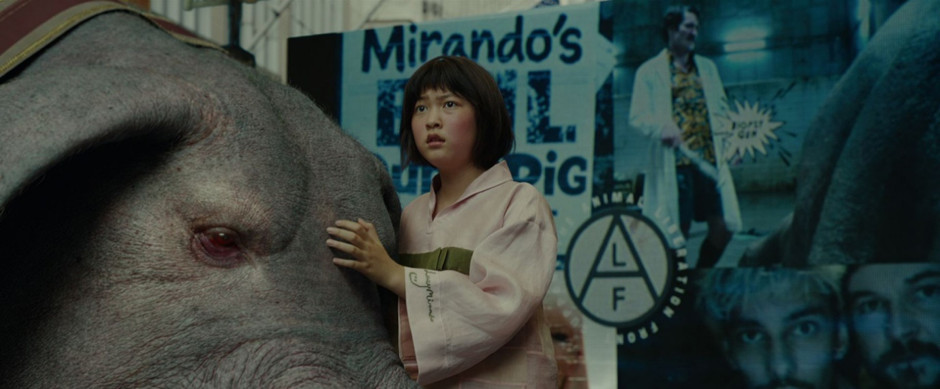
As part of damage repair resulting from the fiasco on the streets of Seoul involving Okja, Mija, Mirando and the ALF, Mirando decides to stage a reunion for Okja and Mija to reduce PR damage and as an image exercise, they have Mija flown over to New York to be a part of the best super pig crowning. She is initially resistant but is forced to attend the ceremony on the pretext that Okja will soon be converted to food. In the lab where Okja is kept, she is forcibly bred with one of the other super pigs, and an inebriated Dr. Wilcox takes a piece of flesh from her that is processed for tasting from volunteers.
As ALF monitors and sees that video, they are disgusted and troubled, when K reveals that he deliberately mistranslated what Mija said that day, at which point an angered Jay attacks him and expels him from the ALF. In an attempt to correct their wrongs, Jay sneaks inside Mija’s room and tells her that they plan to play videos of Okja’s mistreatment at Mirando’s hand while she is on stage, and advices her “not to look back”, and rescue her and Okja while at it. During the ceremony, a blinded and angered Okja from last night’s assault is brought on stage as she refuses to identify Mija and attacks.
Jay, who is watching closely, jumps in to save her by attacking Okja but Mija stops him, calming Okja down. The video is then projected by the ALF and the parade quickly goes into a frenzy as the public denounce Mirando and its methods with their truth now revealed. Amidst the ensuing chaos, Nancy Mirando returns to assume control of the organisation from Lucy and calls upon private security contractors to bring the situation under control. MIja and Jay try to escape with Okja but fail and are rescued by a reformed K, while Okja is recaptured and sent to the Mirando labs with hundreds of other super pigs, where Nancy commands to have full time slaughterhouse operations for the super pigs as she plans to sell them and scraps Lucy’s program entirely, believing that the public will buy it anyway “if it’s cheap”.
The Climax
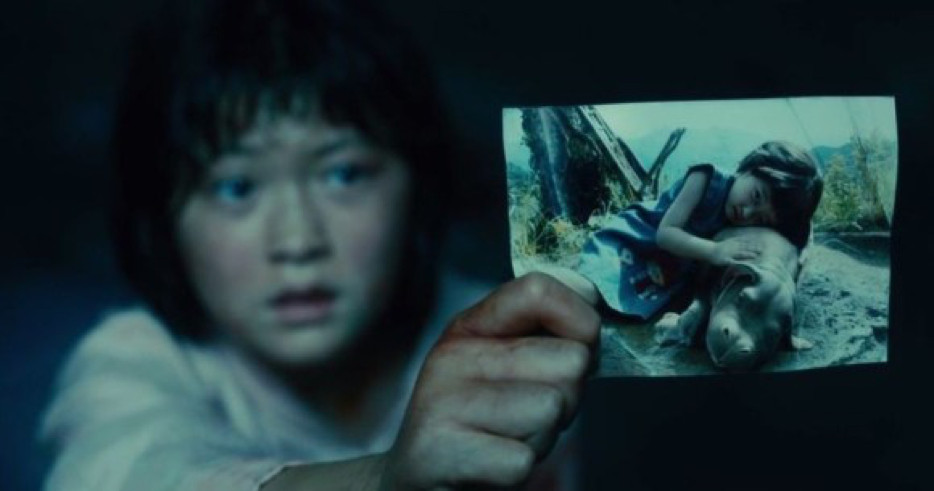
Refusing to give up, Jay and K take Mija to the processing farm/slaughterhouse where Okja is due for slaughter that very day. A dazed Mija, although a meat eater herself, is disgusted at how inhumanly the animals were kept and treated before being slaughtered by machines insensibly in the hundreds every hour. Some of the sights in there are truly upsetting: you see as does Mija, pools of blood being swept across the floor, severed heads of super pigs and mutilated body parts in a great number, and sensitive viewers are better advised to stay aloof.
Okja is discovered by Mija just in time as he is being pushed up a ramp for slaughter, and shows the Mirando employee a picture from her childhood with baby Okja, appealing to his humanity. Nancy arrives and orders the slaughter to go on nonetheless, just as Mija offers her the solid gold pig her grandfather gave her, in exchange for Okja’s life. She agrees to spare Okja’s life, and as they are walking out, in a scene that is literally all kinds of heartbreaking, she sees hundreds of other super pigs on the row for slaughter and nowhere to go. As that happens, two super pigs are able to toss their new bound outside the electrified fence to Mija and Okja, who hides it in her mouth, and the three escape from there. The film ends with Mija having returned to the Korean country side in the hills, resuming her normal life with her grandfather, Okja and the new piglet.
In a post credits scene, Jay is released from prison and boards a bus with K, the other ALF members and some new recruits as the group preps to disrupt a major Mirando meeting involving all of its shareholders.
The Ending, Explained
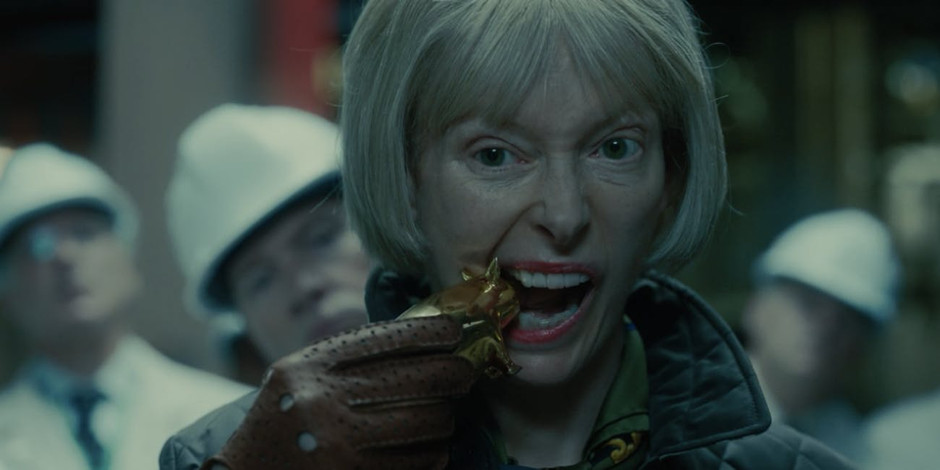
I have to commend director Joon-ho Bong into delivering that finale. If you really think that the ending was a happy one, although I can understand why, you have been successfully tricked into doing so by the celebrated Korean director. ‘Okja’s ending is no happier than say, ‘Schindler’s List’s ending is. Yes, Bong does show Mija and Okja reunited and back to living their quaint life, and the beacon of a new life, another super piglet is with them this time around. From Mija’s point of view, there is literally nothing better that could have happened. But considering all things, Bong wants you to think that you have just been delivered a warm fuzzy ending, while it would seem anything but.
The world outside Mija goes on per usual, the hundreds of super pigs lined up for slaughter in Mirando’s labs and slaughterhouses would still meet the blade, be packaged into foods and sold at supermarkets where millions would consume them, and Mirando would continue to grow in its ruthlessness and power. Mija was able to save her beloved super pig from slaughter, and even a baby piglet too, but what of her parents? What of the others lined up in the slaughterhouses whose wails still echo in my ear, long since I watched the film? Unfortunately so, they will meet their fate, an undeserved end to feed a company’s corporate greed, and if you think THAT is a happy ending, you might need to reevaluate it.
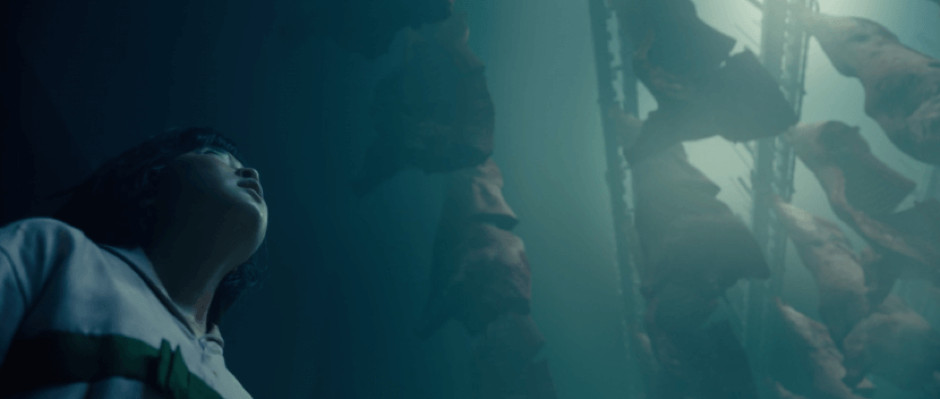
Now while many would question my tall claim of putting ‘Okja’s ending in the same vein as the classic ‘Schindler’s List’, allow me to explain. The only difference between Mija and Oskar Schindler as protagonists is that Mija didn’t fall to the ground wailing and repenting how she could have saved so many more from slaughter, because, well she is a little kid with a worldview of her own. She is content with having saved Okja for now, and getting to return to her home in the forest. I do not for one second claim that she didn’t feel empathy for the other super pigs out there that would be lost to the blade soon, but unbeknownst to her, I am not sure if she is fully aware of the way the cogwheel of the world turns. In saying so, I have to commend Bong again on delivering us a protagonist who is all sorts of endearing, yet tucked away from the easily repugnant ‘modern world’ and its functioning. Through her unbiased and unassuming eyes, we are reintroduced to a reality we closed our eyes to a long time ago.
Post Credits Scene: Will There be a Sequel, Okja 2?
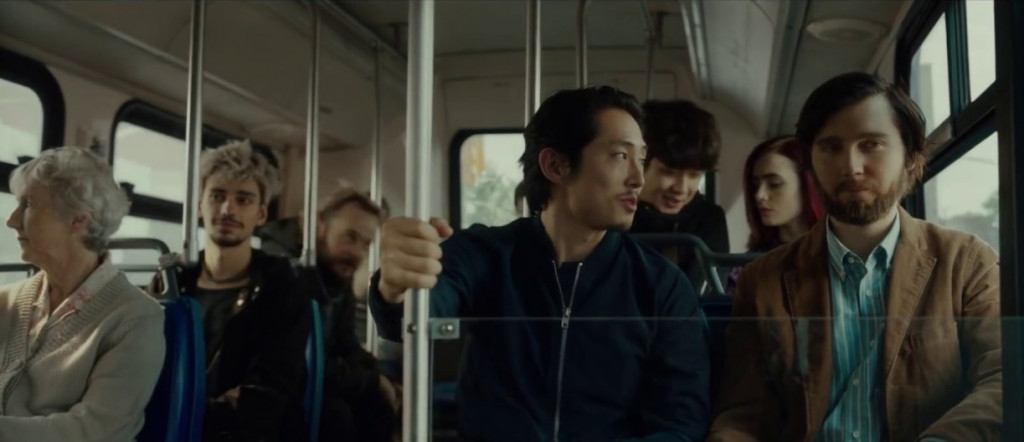
In a post-credits scene, we see that Jay, after getting released from prison, gets on board a bus with K and the other members of that organization. With their newest member Kim Woo-shik, a former driver for Mirando Corporation, they plan to disrupt a major meeting involving all of the Mirando shareholders. While one can definitely interpret this as an open ending, Joon-ho Bong has not indicated any inclination towards making a sequel. Having said that, never say never when Netflix is the distributor. With billions of dollars at their behest, you can’t really predict what Netflix has in mind. Ojka’s ending, even though complete in itself, leaves enough room for Joon-ho Bong or anybody else to take the story forward. The question here is not whether there can be a sequel to Okja, but whether Netflix wants one. The answer to which we don’t know yet.
Themes
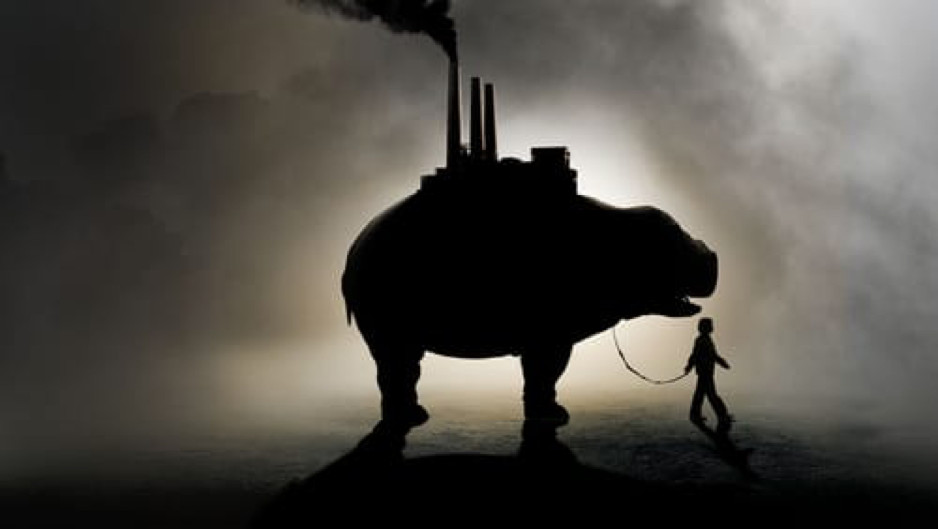
Easily sensed by even a casual viewer, ‘Okja’ is not your casual viewing Saturday Netflix feature. Apart from being intelligibly made, it handles quite a few socialistic themes, ones that we’d do good by us to remember and pay heed to. The first and foremost, most obvious one, even as stated by Joon-ho Bong in a couple of interviews as well would be Capitalism, that seems to be the driving force of virtually everything in the 21st Century.
The modern world, no matter how much we deny it, is owned by corporates and industrial conglomerates that know no better than monetary profit, and sadly so, the future generations will have to deal with their abuse of the environment, something that ‘Okja’ very pertinently and slyly puts across as a point. While at it, I will also add corporate greed to the list in existing in virtually the same vein as Capitalism. At the centre of the story, we have a multinational corporate that knows no ethical bounds when it comes to selling more: “they need to taste fucking good”, as reported by Lucy Mirando when asked about her plans with respect to the super pig program.
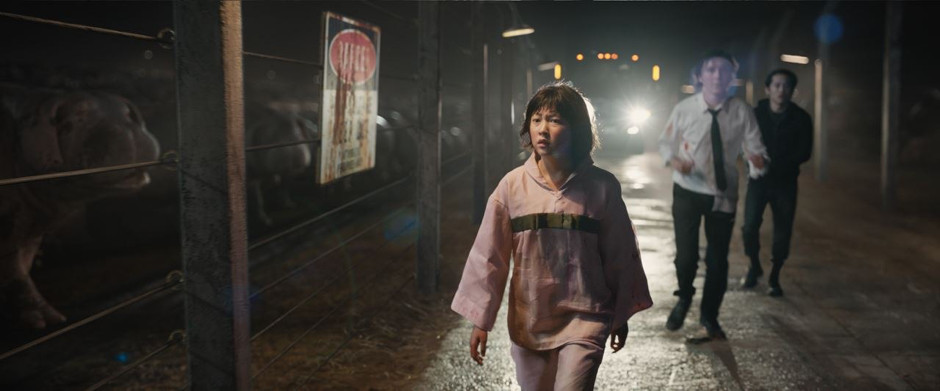
The program itself is masked as an eco-friendly initiative with the genetically mutated pigs stated as having a minimal footprint on the environment, consuming less and producing less excretions. It is of course a farce and a decorative cover up for the genetically mutated pigs, which sadly is the reality of the world we live in and the food we consume. Virtually everything, from the fruits and vegetables we consume to the meat we have is genetically mutated to taste better, grow faster, and well, just be bigger to record better sales.
Mirando may in itself be a fictitious organisation, but it is a metaphorical and often satirical representation of virtually every agro based MNC out there: degrading food just to increase yield through machines by mass production to feed an ever-growing population, and make a ton of money while at it. In doing so, Bong also holds up a mirror to the hypocrisy of the society and to us as consumers. ‘Okja’ isn’t intended to be a pro-vegan movie or anything in that vein, since we see even Mija, the protagonist being fond of non-vegetarian food herself, as she consumes fish and chicken stew in the initial parts of the film. What it does seem to hold a grudge against is the inhumanity and the brutal treatment meted out to livestock involved in the inherent mass production and the defiling of food through genetic mutation. In that, a campaign such as the super pig program that is just cosmetic masking so that consumers like us can feel good being oblivious to a harsh truth, ‘Okja’ and director Joon-ho Bong label us as equal perpetrators in the cogwheel.
Final Word
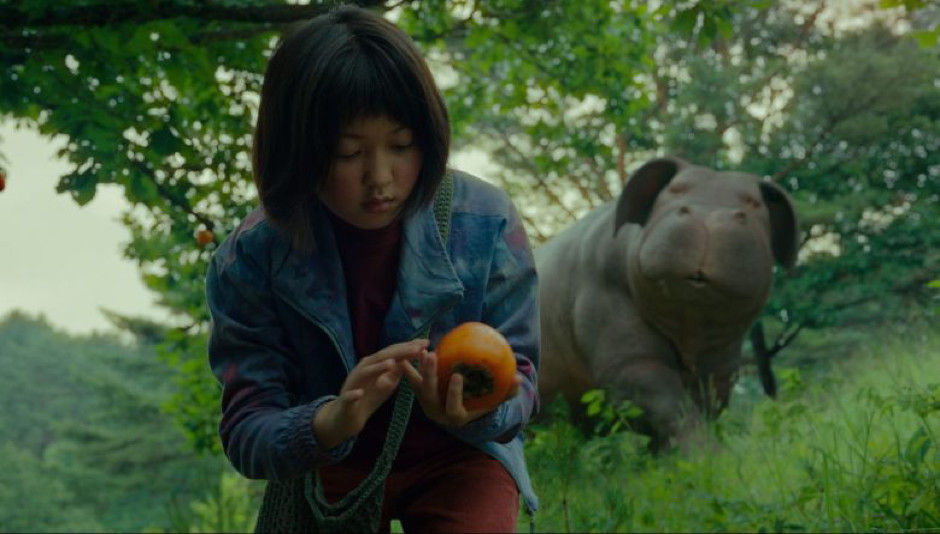
No question about it, even if it’s a tough watch in its last bits, it is thoroughly charming throughout, even heart breaking in some and eye-opening in others. It’s whimsically funny, aware of what it has set out to do, has characters that are more like caricatures that never rise up from being so, which works positively in the film’s favour and an unmistakably endearing friendship at its core between man and beast that WILL almost in guaranteed fashion drive the message home. It is one of the most experimental films Netflix has ever worked with, an almost ‘E.T’ like fairy tale set in the grim real world of today, and in the hands of the gifted Joon-ho bong, this genre melding film rises above its socialistic ‘preachy’ vices to deliver a film that is equally engaging, and might I say, whimsically entertaining as well. A rare, standout Netflix original , among its best in years.
Read More in Explainers: Prisoners | Se7en | Reservoir Dogs

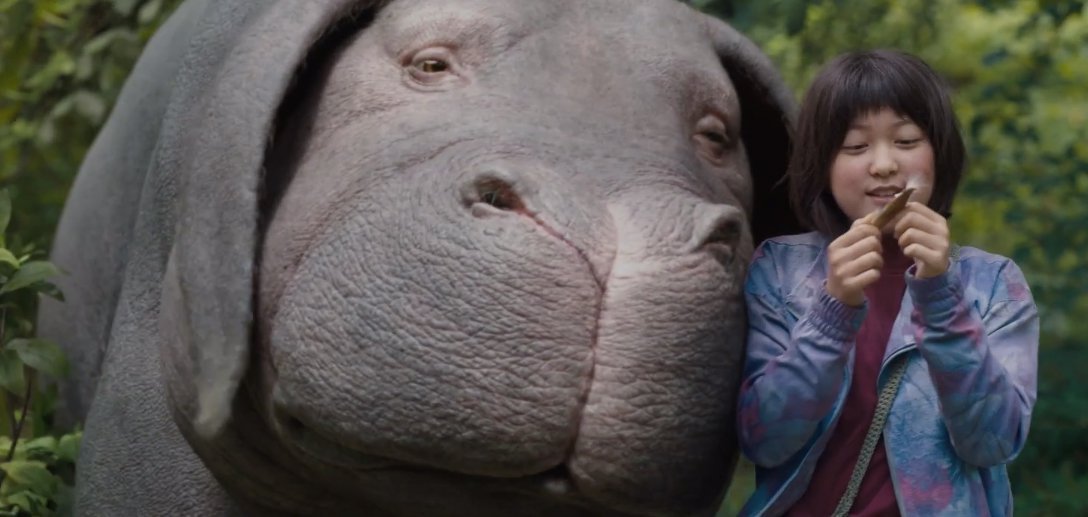
You must be logged in to post a comment.